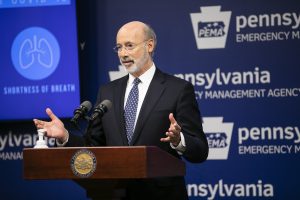
Pennsylvania will have a budget come July 1.
On Friday, Gov. Tom Wolf signed the state’s interim budget that lays out $25.8 billion in spending. The plan was approved with support in the legislature.
The stop-gap budget funds most state agencies for the next six months, but provides a full year of funding for education. The spending plan allocates $2.6 billion of $3.9 billion in federal funding provided through the Coronavirus Aid, Relief, and Economic Security (CARES) Act, $625 million to counties through block grants, $420 million to assist nursing homes with COVID-19-related expenses, $225 in grants for small businesses through the Pennsylvania Department of Community and Economic Development, and $50 million to fund efforts to fight food insecurity.
Earlier in the week, Wolf said the full impact of the COVID-19 business disruption’s impact on the state wallet will become more clear once the tax deadline comes on July 15. In April, state revenue officials said April tax income estimates came in 50 percent below where they were expected before the pandemic.
Under the budget, funding will be sustained at 2019-2020 levels for Pre-K Counts and Head Start, basic and special education in K-12 schools, and higher education.
“The spending plan recognizes the importance of public education in these difficult times by providing full-year funding for schools and maintaining investments without reductions in basic education, special education and other critical state subsidies. The new budget will enable school districts to move forward with the needed certainty from the state on matters of funding so they can plan appropriately at the local level,” Pennsylvania School Boards Association said in a statement.
“As the state’s economy begins to reopen from the public health emergency, there are still unanswered questions about the state’s finances, but this agreement is an important step to stabilize our schools and put Pennsylvania on a path to recovery,” said Wolf.
“Every Pennsylvanian is making sacrifices as a result of this pandemic and a two-part budget for this year reflects those sacrifices and provides stability and certainty to millions of Pennsylvanians,” said House Majority Leader Bryan Cutler, a Republican from Lancaster. “We cannot project the impact on state revenues due to the statewide business shutdown and moving the state tax deadline to July 15. This budget plan allows us to keep the state operating efficiently now, and responsibly fund all programs in the future.”
“Throughout the last 20 years that I have served in the General Assembly, our state has never been faced with such a great deal of fiscal uncertainty. The interim budget passed by the Senate today will help to provide our Commonwealth with stability during these challenging times,” said Senate President Pro Tempore Joe Scarnati, a Republican from Jefferson County.
The temporary budget is set to expire at the end of November.








